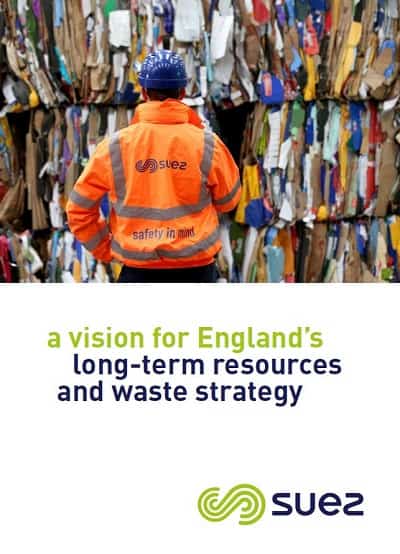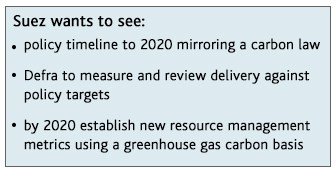A 50% minimum recycled content in packaging by 2025 needs to help minimise waste throughout the value chain, waste and resource firm Suez UK said today.
And, Suez wants to see every local authority get its own bespoke recycling target.

Published today by Suez, the report proposes a “vision” for England’s long-term resources and waste strategy
The minimum content, said the company, is one of four specific measures it proposes in a “vision” published today (29 May). The document, ‘A vision for England’s long-term resources and waste strategy’, also suggests that products should display a standard form of environmental labelling, similar to the existing EU energy ratings for white goods, to help consumers vote with their wallets and accelerate the change to more sustainable design.
Brexit
The wide-ranging document which covers household recycling through to end of life vehicle recycling, says that the UK is facing “uncertain times” because of Brexit but that this also provides an opportunity to deliver positive change.
David Palmer-Jones, chief executive of Suez recycling and recovery UK says: “We believe a golden opportunity therefore exists for the UK to create a policy context which not only places the UK at the forefront of environmental sustainability, but uses efficient resource management and sustainability to spur new levels of productivity and economic competitiveness within the global economy.”
He explains that the company has a wide perspective because of involvement with companies across many sectors, working through the design, manufacturing, logistics and sale of their products and services to post-consumer collection treatment and re-manufacturing of materials from both municipal and commercial sources. This perspective, reasons Mr Palmer-Jones, means the company has been able to consolidate its experience into a ‘manifest of sorts’ which it offers as a vision for waste and resource policy.
On collection systems, Suez suggests the introduction of pay-by-weight system which would proportionally “reward behaviour and resource recover”. The manifesto appears to suggest that current collection systems should effectively be discontinued reasoning that various collection combinations and innovations will see the materials collected. No direct mention, however, is made in the manifesto at this point of the connection between collections system and residual waste.
“We believe a golden opportunity therefore exists for the UK to create a policy context which not only places the UK at the forefront of environmental sustainability, but uses efficient resource management and sustainability to spur new levels of productivity and economic competitiveness within the global economy.”
David Palmer-Jones
Suez
Suez argues that the sole purpose of collection systems is to ensure “the target materials are collected and transported in an environmentally and economically‑efficient manner. There are a multitude of different collection systems that can, and should, be utilised in a plethora of combinations. The weighing of all individual containers will quantify the volumes of materials being generated (an essential element of resource management) and the introduction of pay-by-weight will proportionally reward behaviour and resource recovery.”
Capacity
Much attention is paid in the “manifesto” to the need for residual waste treatment capacity. Suez suggest that using data captured through the value chain, overlain with the policy objectives and targets would allow accurate assessments of the need for future capacity which has been a topic of debate in recent years.
Suez calls for a “waste treatment capacity review committee” under the management of Defra to annually review new capacity delivered, under construction and the new facilities required.
In terms of infrastructure, the company concedes that not all “new technology” type of projects go to plan. It notes that its Bristol pyrolysis facility for converting poor quality end of life plastics into fuels was mothballed in 2017. But, it claims that in 2018 seven facilities using gasification and pyrolysis will be opened.
Suez says that landfill still has its place, especially as a solution when a quick demand arises for waste disposal, but that to get new infrastructure, such as energy from waste plants, “Long-term treatment policy visibility” is needed. To build “the necessary systems and infrastructure to deliver the long-term transition to a circular economy, it is essential that policy and targets are set sufficiently far ahead in time to provide investment certainty”.
Suez wants to see:
- policy timeline to 2020 mirroring a carbon law
- Defra to measure and review delivery against policy targets
- by 2020 establish new resource management metrics using a greenhouse gas carbon basis
And, the company’s proposal for bespoke recycling targets for local authorities would see them set according to their own structural opportunities and constraints, with all such targets collectively aligned to meet national objectives.
Targets
The national targets suggested in the manifesto are for the adoption of a 55% recycling target by 2025 based on weight, and adopt a 45% target by 2025 for the residual element of a household’s waste, falling to 30% by 2030. New metrics will apply post 2030.
Suez appears less than enthusiastic in the manifesto for food waste collections because of the marginal costs. The company warns: “Food waste collections from households and businesses have grown significantly over the last 10 years, but only a minority of authorities or businesses make financial savings by adopting separate food collection alone. Some authorities which have reduced their residual waste collection frequency in conjunction with new food waste collections have saved money overall, but it is a marginal calculation around the volume of food waste diverted (saving a gate fee delta of >£50 per tonne against residual waste costs) and the increased cost of a weekly food waste collection – which typically only amounts to a few kilos per household.”
The post Suez calls for bespoke recycling targets appeared first on letsrecycle.com.
Source: letsrecycle.com General




